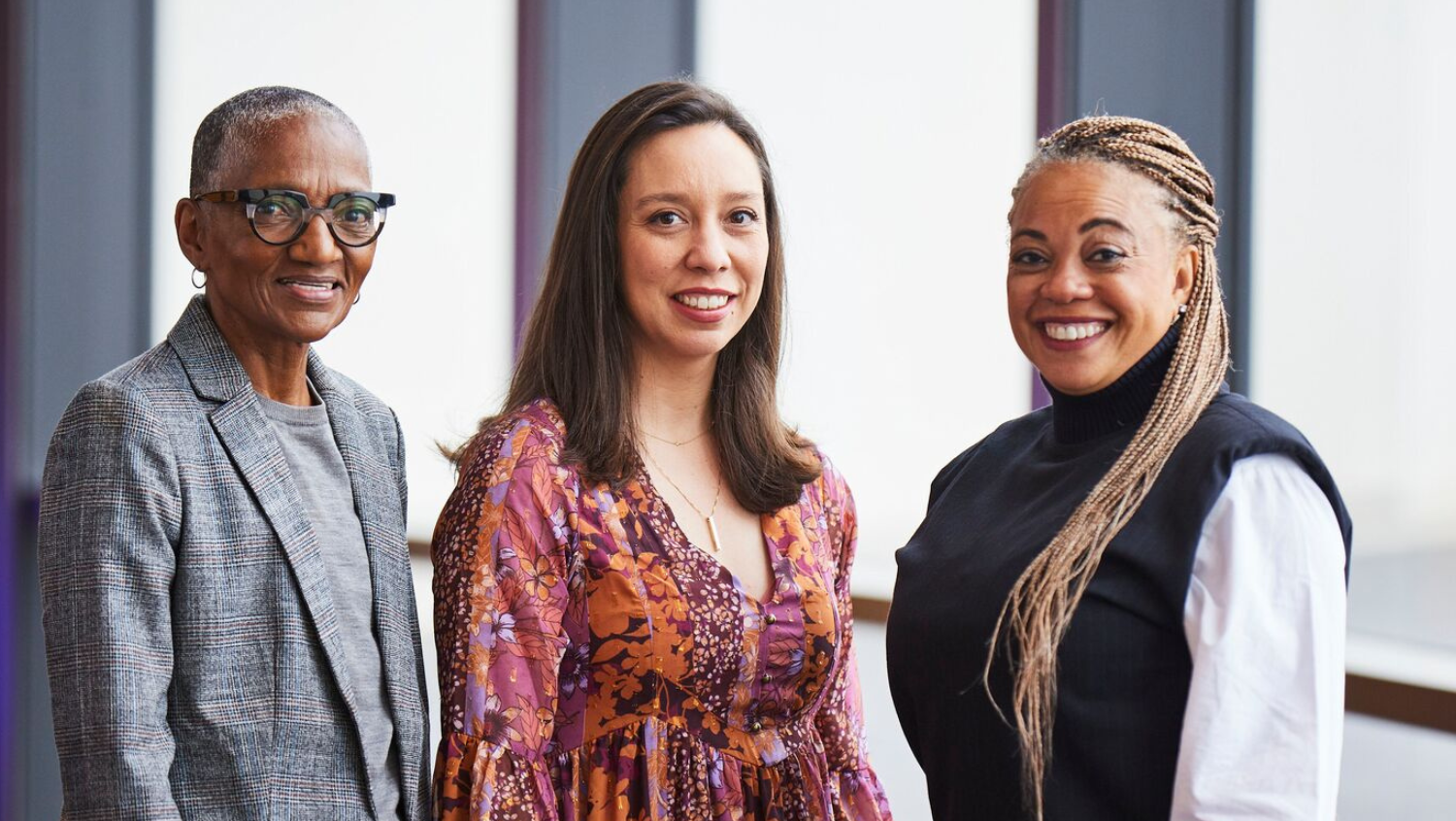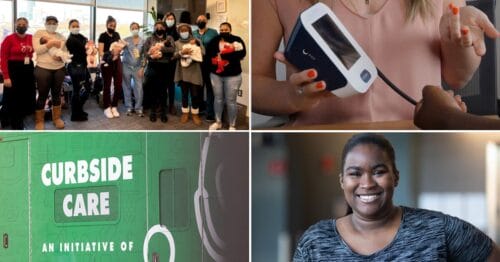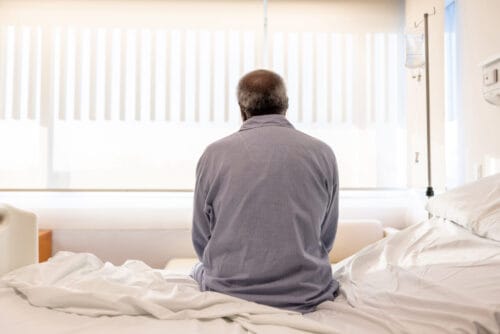In Its Second Year, BMCHS' Health Equity Accelerator Sees Racial Gaps Closing for Pregnancy and Diabetes
February 22, 2024
By Meryl Bailey

Pat Piasecki/Boston Medical Center
(L to R): Thea James, MD, MBA, Elena Mendez-Escobar, PhD, MBA, Petrina Martin-Cherry, MBA (Pat Piasecki/Boston Medical Center)
The initiative will begin to tackle gaps in cancer screenings in 2024.
In Boston, where life expectancy can differ by 23 years between zip codes, Boston Medical Center Health System (BMCHS) launched the Health Equity Accelerator. Aligning strategy, analytics, clinical operations, and community engagement all through a health equity lens, the ambitious initiative takes aim at the community’s most significant racial health disparities. In 2023, fueled by the Accelerator, clinical programs delivered impactful wins. Uncontrolled diabetes in hospital patients is declining, and obstetrics boasts improvements such as lower readmission rates for preeclampsia.
Community engagement, economic investment, and advocacy continue to be powerful tools to address the root causes of health disparities. This year, Nubian Markets opened its doors in Roxbury, thanks to support from BMCHS as part of its community investment work. The Accelerator continues to elevate the conversation through advocacy and launched the inaugural EQTY 2023: A Summit for Health Justice last September to inspire new policy and healthcare models with equity at their core.
HealthCity recently sat down with co-executive leaders of the Accelerator Thea James, MD, and Elena Mendez-Escobar, PhD, MBA, as well as BMC’s Vice President of Community Engagement and External Affairs Petrina Martin Cherry, MBA, to discuss the Accelerator’s momentum in 2023 and its aspirations for 2024.
HealthCity: Reflecting on the past year, what are you most proud of accomplishing through the Health Equity Accelerator?
Elena Mendez-Escobar, PhD, MBA: I believe we have lived up to the name Accelerator this year. We are quickly transforming how we deliver care, as evidenced by the exciting progress we have seen in our clinical initiatives. Thanks to the partnerships we have built with our patients and community leaders, we’ve had more than 3,000 patients enroll in our health equity programs. This pace is exceeding our expectations of what we thought we could do in the first two years of the program. I’m so proud of how many talented colleagues are deeply committed to this work.
Thea James, MD, MBA: I’ve never seen something like this in my career in medicine. The Accelerator allows us to move at an unusually rapid pace. A talented cast behind all of the work makes it possible. We are fortunate and grateful to them for their effort. We committed to health equity, and we are achieving it.
We investigated the gaps in our health system that, when interrogated back to the root cause, turn out to be inequities. Now, we are starting to see data to prove it. Through our advocacy, we are showing policymakers what’s possible.
We holistically approach health equity, beyond clinical innovation, to address economic mobility, community investment, and affordable housing. In the past, these might have been termed “boil the ocean” non-starter tactics, but lawmakers are taking notice as we continue to demonstrate success in addressing root causes that result in a reduction in disparity gaps. Take food insecurity, for example. I am hopeful new policies will continue to offer access to food subsidies, but I also hope they will offer access to the root cause of food insecurity and economic opportunities like workforce development simultaneously. This leads to financial security and opportunities for asset building, which lead to better health outcomes. It also enables a boost to our economy and our GDP through new contributions from workers.
Petrina Martin Cherry, MBA: We have been committed to making sure our community has access to economic mobility opportunities and we have done that by investing directly in the community. In 2023, we celebrated the opening of Nubian Markets, and we are incredibly proud to say we were able to support them through our Determination of Needs funds. While our primary goal was to support a Black-owned business, through this partnership, we did so much more! We were able to support an incredible community ownership space for Roxbury; a space not only for amazing food, but one for the community to feel a sense of belonging and pride. I am filled with excitement as we continue to create pathways and access to economic mobility for our community!
HC: The Accelerator hosted its inaugural EQTY summit in September. What are some of the key outcomes of that first gathering?
EME: I think what is really exciting for me about the Summit was how we have stopped admiring the problem and moved the conversation to action. We brought together many experts who are action-oriented to exchange ideas and really learn things that are changing how we all approach our day-to-day. Partnerships were created and collaborations are stemming from those discussions. I came out of the Summit excited about how participants elevated the conversation and how these ideas will shape what we do over the next year.
TJ: I think one of the most important things that the Summit did was demonstrate to people what “mission-driven” means. I had executives from other healthcare systems email me that they had never seen anything like this. All the panels were impressive, but the Summit also disrupted all the narratives that keep people from trying to transform their approach to health equity.
HC: What are you most excited about for the Accelerator to accomplish as you look ahead to next year?
EME: Looking toward next year, I am excited to see even more clinical breakthroughs and more transformation in how we collaborate with our patients to better align our care with their expectations. We will continue to enroll more patients in our pregnancy and diabetes initiatives as well as new clinical areas to expand our impact.
We just launched Equity in Cancer with the aim to reduce racial disparities in cancer screenings. There are indications to suggest that throughout the country Black, Hispanic, and Latino/a patients are diagnosed at later stages in all cancers because they’re screening less frequently or later. This obviously impacts their health outcomes. We will look to create tools to make sure everybody gets screened in a timely manner.
PC: As Elena said, as we look forward to next year, one of our primary areas of focus will be on the current gaps in cancer screening and treatment. We will engage the community to hear their perspective on why these gaps exist, which will help us define how we move forward in that work. At BMCHS, we are committed to doing work that will yield results to closing disparity gaps, and the only way to do this is to be advised and led by the community.
TJ: I feel like the goal ultimately is going to be to continue to redefine the notion of what a safety-net hospital is. Its role is to address all the traps that keep people from getting where they want to be and alter their life trajectories to where they and their families become self-sufficient. I think we can model that for the nation. From what’s happened in the last year, I can’t imagine what would stop us.
This interview has been edited and condensed for clarity. Save the date for EQTY2024 on September 12, 2024 in Boston. Learn more on the EQTY2024 website.


